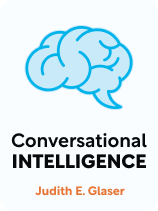

This article is an excerpt from the Shortform book guide to "Conversational Intelligence" by Judith E. Glaser. Shortform has the world's best summaries and analyses of books you should be reading.
Like this article? Sign up for a free trial here.
What is conversational intelligence? Why are conversations crucial for human connection?
In Conversational Intelligence, Judith Glaser explains what conversational intelligence is and the qualities that define a good conversation. Conversations are especially important at work for better trust and team-building.
Read below to learn more about conversational intelligence.
The Importance of Good Conversations to Human Connection
What is conversational intelligence? Glaser claims that good conversations aren’t just about sharing information: They’re a complex form of social interaction that influences how we see the world, how we act in it, and how we come across to others. They have the potential to change how we relate to others and give us the opportunity to practice empathy toward them.
(Shortform note: Archaeological research seems to confirm the evolutionary importance of language to human development. Some researchers believe that humans first started speaking with each other (somewhere between 50,000 and two million years ago—the estimated time frame is very wide) to help each other create the stone tools that were critical for their survival. It thus seems that from the beginning, we’ve been using language to help and learn from each other.)
Glaser feels that all success in life and work depends upon your ability to hold a good conversation. However, most leaders don’t understand how critical strong conversations are to building healthy, productive relationships at work and how detrimental poor conversations are to those relationships. Often, leaders only initiate poor conversations, which stymies the company’s growth.
(Shortform note: The authors of Crucial Conversations agree with Glaser on the importance of holding good conversations at work, listing more specific competencies that good conversationalists bring to the workplace: Employees who are good at holding conversations are more productive and react faster to financial downturns. They add that many leaders who don’t understand the importance of conversations mistakenly think that policies and organizational systems are what make employees productive and effective—but it’s conversation skills that matter more.)
Defining Conversational Intelligence
Conversational intelligence is essentially the ability to orchestrate a good, effective conversation that fosters trust and respect based on your understanding of how the human mind works.
So what is a good conversation? According to Glaser, a high-quality conversation is one in which you build a dialogue with others, innovate together, let ideas change and evolve, and focus on your community, rather than on yourself. In short, in a good conversation, you don’t cling to your own ideas or try to be right, but instead open yourself to changing from the input of others so that you can come to a solution together.
As a leader, you want most conversations in your workplace to be such high-quality conversations because they’re the most productive and lead to the best outcomes and higher employee happiness.
(Shortform note: Glaser writes that you should focus on your community or team rather than on advancing your own ideas to hold a good conversation. In The Ego Is the Enemy, Ryan Holiday offers another reason why you shouldn’t focus so much on yourself, but he frames this argument in the context of personal development rather than workplace productivity. According to him, you achieve more personally when you don’t talk and think about yourself all the time. This is because talking about yourself and your goals eats up time you could spend trying to achieve them. Further, thinking about yourself makes you more concerned with your superiority than the tasks that lead to success.)
For instance, as a conversationally intelligent leader, you might facilitate a successful mediation between two employees because you understand what each person needs from the interaction to be able to rebuild trust in the other. Conversely, if you’re not a conversationally intelligent leader, you might resort to unsuccessful mediation tactics like forcing employees to apologize to each other or list their complaints about the other.
Glaser contrasts good conversations with other types of conversations in which you simply seek to exchange factual information (to set up the time and date of a meeting, for instance) or present a position and try to move the other person to take that position (for instance, if you want your colleague to agree with you on the format of your presentation). These styles aren’t inherently bad and are often necessary. They simply aren’t suited to important, high-level workplace conversations.
(Shortform note: It’s likely that emotional intelligence goes hand-in-hand with conversational intelligence. Emotional intelligence is the capacity to understand and regulate your emotions and to understand the emotions of others. You need emotional intelligence to grasp how others are feeling during a conversation and to steer the conversation to foster trust.)

———End of Preview———
Like what you just read? Read the rest of the world's best book summary and analysis of Judith E. Glaser's "Conversational Intelligence" at Shortform.
Here's what you'll find in our full Conversational Intelligence summary:
- The importance of conversations to human growth and success
- How to deploy conversational intelligence and avoid dialogue-killing distrust
- The five steps to regain trust if you've lost it






